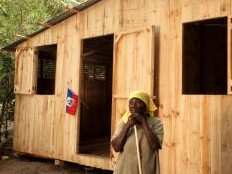|
||||||||||||||||||
| Download the revised decree and electoral calendar, published in the official journal |
|
|
Haiti - Reconstruction : Approximately one third of the refugees have found shelter 22/01/2011 15:54:52
One third of the 1.5 million individuals who have been living in "tent cities" have relocated to date, with another 400,000 expected to relocate over the next 9 months. According to Gabriel Verret, Executive Director of the Interim Haiti Recovery Commission (IHRC), one third of the approximately 1.5 million individuals who were living in camps as recently as last July have relocated as cited by to IOM Haiti camp coordination, camp management cluster displacement tracking matrix version 2.0 update from December 9 2010. This is due to various trends, including the return of families to homes that have not only been repaired, but are sturdier and more resilient than before the quake; the construction by agencies and households of temporary housing in people’s neighborhoods of origin; and relocation decisions made by families, sometimes in response to relocation incentives. "Housing is a major priority, and our goal is to help families return to safe permanent housing in safe neighborhoods. This may entail either repair or reconstruction of a home that was damaged in the quake, based on decisions each owner has to make" says Verret. "In some cases, rehousing people safely may involve relocation; however, in general, people prefer to stay in familiar territory. We are measuring progress one family and one house at a time." Moving all of the families who are now in temporary shelters or precarious housing situations into more permanent, safer quarters continues to be, along with the removal of rubble, the most pressing goal of the recovery. The Government of Haiti has taken important steps toward that end, including evaluating nearly a half-million damaged homes for habitability and publishing new construction guidelines for both engineered and non-engineered structures. Debris removal is critical to open up neighborhoods and allow to construction to begin on larger-scale housing programs that have been approved by the IHRC. As of December, 2010, nine projects, valued at $191.3 million, have been approved for the housing sector. These projects include the $2.5 million Village Housing Project, by Mission of Hope Haiti, designed to provide rural housing for 3,000 Haitians; a $30 million community-driven development project sponsored by the World Bank to upgrade urban neighborhoods, and repair and rebuild 5,000 housing units; a $53.3 million project by USAID to finance 15,000 serviced sites in new communities in the Cap Haitien and Port-au-Prince Development Corridors; $26 million housing project, presented by the City of Port-au-Prince and funded in part by France, to develop informal settlements; and a $65 million project by USAID to finance housing and neighborhood upgrading in earthquake-damaged communities for 10,000 households. "What is happening in the housing sector in Haiti may not be visible to everyone, but it is in fact very encouraging, and well in line with the timing of recovery from other large-scale disasters," adds Verret. "The nation is getting back on the path to normalcy and progress. Most importantly, what is happening is beginning to provide families with opportunities to stand back on their feet and to safely return home." About the Interim Haiti Recovery Commission The Interim Haiti Recovery Commission (IHRC) was created by presidential decree on April 21, 2010, in the wake of the devastating earthquake that struck Haiti on January 12, 2010. The mission of the IHRC is to undertake the expeditious planning, coordination, and facilitation of development projects and priorities, including reviewing and approving projects and programs funded by bilateral and multilateral donors, NGOs and the private sector. The IHRC is co-chaired by Haitian Prime Minister Jean-Max Bellerive and President Bill Clinton and is guided by a Board, which includes Haitian and non-Haitian stakeholders in reconstruction efforts. HL/ HaitiLibre
|
|
|
Why HaitiLibre ? |
Contact us |
Français
Copyright © 2010 - 2026 Haitilibre.com |





